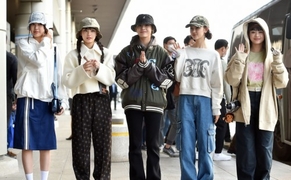 |
| Kim Sung-han, a professor of Korea University’s Graduate School of International Studies and former National Security Adviser, delivers a presentation at AsiaToday’s Reception and Indo-Pacific Vision Forum 2023 in celebration of its 18th anniversary held at the CCMM Building in Seoul on Nov. 9, 2023. / Photographed by Jung Jae-hoon |
AsiaToday reporter Hong Sun-mi
Kim Sung-han, a professor of Korea University’s Graduate School of International Studies and former National Security Adviser, stressed that South Korea, the United States, and Japan, which share free democratic values and worldviews, must play a central role to make Indo-Pacific region prosperous.
Prof. Kim said that the “central axis of South Korea, the U.S., and Japan” is the most realistic cooperation in deterring and defending North Korea as well as dealing with security threats in the Indo-Pacific region, stressing the role of the trilateral alliance. In particular, he stressed that South Korea, the U.S., and Japan should form proper solidarity with minilateral cooperation such as Quad and AUKUS and cooperate with Southeast Asian countries based on the central axis of trilateral cooperation, to protect freedom, peace, and prosperity in the region more effectively.
His remarks came during his presentation at the Indo-Pacific Vision Forum 2023 hosted by AsiaToday on November 9.
Under the theme of “Indo-Pacific Vision and Korea-U.S.-Japan Cooperation,” prof. Kim said that freedom and peace must be expanded and settled in the Indo-Pacific region, to move toward prosperity. “South Korea, the U.S. and Japan held a summit at Camp David in the U.S. in August to open a new chapter of history for trilateral cooperation,” he said.
“The top priority the three countries face in common is the North Korean nuclear issue,” prof. Kim said, stressing the need to press North Korea over economic and human rights issues.
His remarks point out that the North’s rejection of President Yoon Suk-yeol’s “bold initiative” proposal and its series of provocations and hardline stance is one of the factors of international instability that requires pressure through trilateral solidarity.
He pointed out cyber pressure is necessary to block cryptocurrency hacking, which is the source of funds for North Korea’s nuclear missile development.
“After close consultations, both South Korea and the U.S. agreed to form the Korea-U.S. Nuclear Consultation Group (NCG) based on the ‘Washington Declaration’ at the summit in April, and the NCG was officially launched in July,” he said, adding, “It is a great step forward that the U.S. has laid the foundation for sharing the process of operating nuclear weapons with South Korea through the NCG.”
“If working-level consultations between South Korea and the U.S. are held in-depth, both countries are expected to draw up a nuclear operation plan against the North Korean nuclear threat.”
Prof. Kim also suggested that South Korea, the U.S., and Japan should cooperate organically with Quad (security partnership between Australia, India, Japan, and the U.S.), AUKUS (security partnership between Australia, the U.K., and the U.S.), and the Five Eyes (intelligence alliance comprising Australia, Canada, New Zealand, the U.K, and the U.S.) to produce practical consultations to increase the effect of freedom, peace, and prosperity in the region and produce concrete results.
#Vision Forum #Kim Sung-han
Copyright by Asiatoday
Most Read
-
1
-
2
-
3
-
4
-
5
-
6
-
7





















